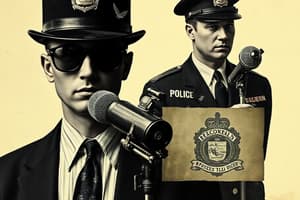Podcast
Questions and Answers
What was the premise of the case?
What was the premise of the case?
Separation of church and state in the public schools in the United States.
What was the Alabama Law?
What was the Alabama Law?
The Alabama Law authorized Alabama public school teachers to set aside one minute each day for a moment of 'meditation or voluntary prayer.'
What was the date of the incident?
What was the date of the incident?
May 28, 1982
What happened?
What happened?
What was the plaintiff's claim?
What was the plaintiff's claim?
What was the defendant's claim?
What was the defendant's claim?
What was the verdict at the United States District Court?
What was the verdict at the United States District Court?
What was the verdict at the United States Court of Appeals?
What was the verdict at the United States Court of Appeals?
What are the implications for today?
What are the implications for today?
Why is this case important?
Why is this case important?
Can public schools in the United States practice any type of religious practice?
Can public schools in the United States practice any type of religious practice?
Can private schools in the United States practice any type of religious practice?
Can private schools in the United States practice any type of religious practice?
Flashcards are hidden until you start studying
Study Notes
Case Overview
- The case centered on the principle of separation of church and state in U.S. public schools.
- Examined the legality of religious practices within public education frameworks.
Alabama Law
- Authorized public school teachers in Alabama to allocate one minute daily for "meditation or voluntary prayer."
Incident Details
- Occurred on May 28, 1982.
- Ishmael Jaffree's son faced peer teasing for not participating in school prayers.
Legal Claims
- Plaintiff's Claim: Mobile County Public Schools violated the First Amendment rights, applicable to states via the Fourteenth Amendment, by permitting religious prayers.
- Defendant's Position: Asserted compliance with state law permitting voluntary prayer.
Court Verdicts
- United States District Court: Ruled in favor of the defendants, allowing prayer in schools.
- United States Court of Appeals: Reversed the earlier ruling, declaring the Alabama Law unconstitutional.
Current Implications
- Public schools cannot engage in religious practices due to the established separation of church and state doctrine.
Significance of Case
- Highlights critical Constitutional rights related to religious freedom and the governance of public education.
Public vs. Private Schools
- Public schools are prohibited from practicing any religious activities as a direct result of this case.
- Private schools are not affected by this ruling and can conduct religious practices as desired.
Studying That Suits You
Use AI to generate personalized quizzes and flashcards to suit your learning preferences.





